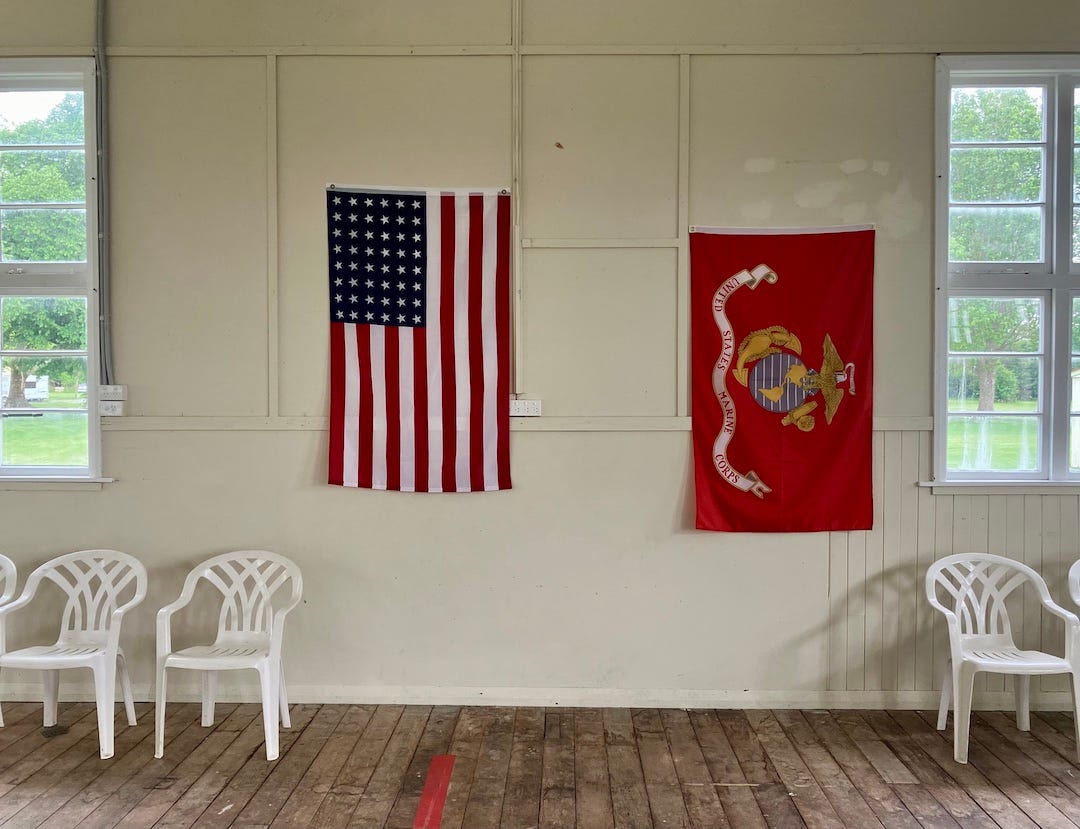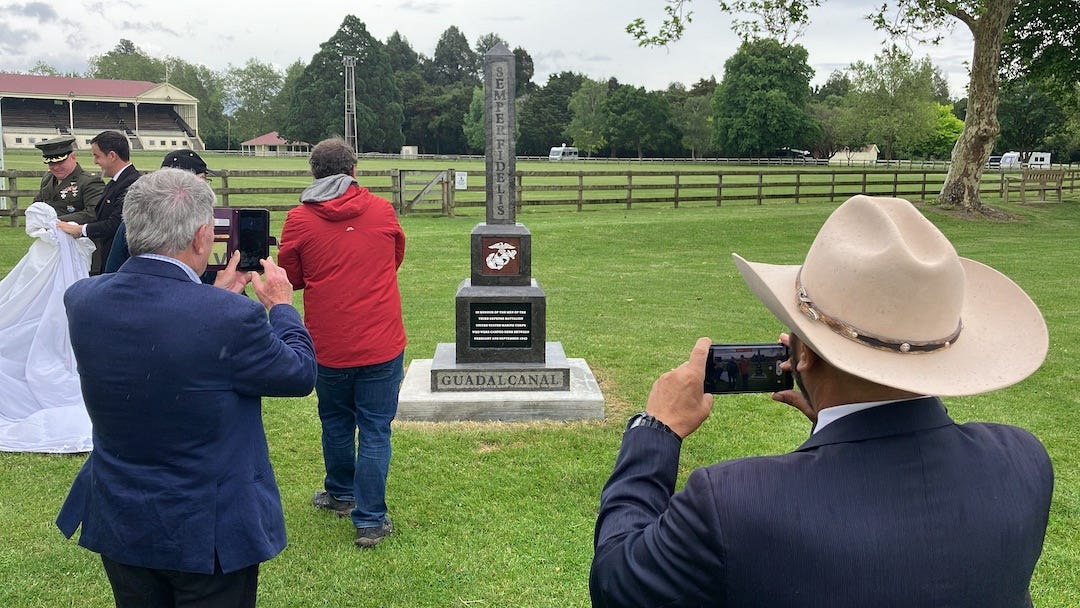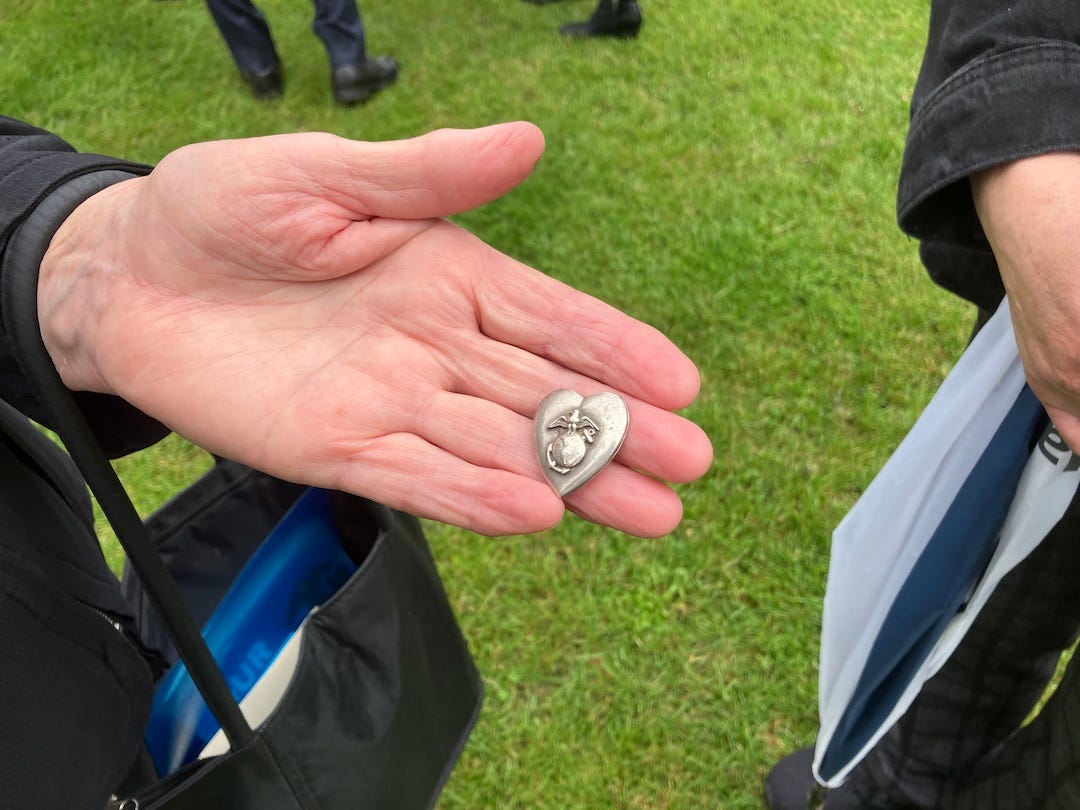They Came From Hell, and Went to New Zealand
Unveiling Masterton's monument to the original Americans in NZ
Once upon a time, the U.S. Marines came to Masterton, New Zealand. This is not, worldwide, a novel occurrence. In our two and half centuries we Americans have sent troops more or less everywhere. We borrow a cup of sugar, we bail out our buddies, and sometimes we rain death. Here on the forest moon of NZ the occupation, as it were, played out (mostly) between the first two options. Last week we gathered at the Solway Showgrounds on the south side of town to remember the Marines who bivouacked there from March to October of 1943. Two battalions, two thousand boys on a breather between Guadalcanal and Bouganville. “They had come from Hell,” said our host Mark Pacey, historian at the Wairarapa Archives. “And after seven months of peace, they were going back to it.” Pacey wrote a great book about their stay, then built the Marines a handsome memorial in his own garage. Now it waited outside under a rain-damp sheet.
Jenny and I attended the ceremony out of a duty we couldn’t really explain. Or rather: the explanation is so blunt it feels silly to type. We’re Americans, duh. For where two or three are gathered in my name, there am I in the midst of them—that’s the vibe, as two former church kids would name it. It’s a pretty slick magic trick, the way you can summon a whole nation just standing around a stone on the far side of the Earth. This is patriotism, I suppose, though of an oddly inverse sort. I love my country most when standing at its furthest edge.
We were not alone, American-wise. An actual present-day Marine had driven over the hill from the Embassy in Wellington. No dress blues, just the sturdy olive drab of the Alpha kit, which looked very WWII indeed. There was the former NZ Defense Secretary, a two-time Carterton mayor and tireless gadfly, not technically a citizen but in his carriage, demeanor, and ever-present cowboy hat the most American Kiwi I’ve ever seen. I chatted with a librarian I know who moved down from DFW. A Vietnam Vet from out on the Kapiti Coast teared up speaking of the boys who never came home. The rest of the small crowd, I assumed, were the sort of civic-minded retirees who turn up for council meetings.
The decorations were Kiwi minimal, but not Kiwi. No New Zealand flag. The good ol’ Stars and Stripes, and then, a nudge lower as protocal requires, a red Marine Corps banner, with the globe-and-anchor I first learned to recognize from faded tattoos. Look closer at the US flag: that’s the old 48-star model. Hawaii and Alaska had long since been conquered and bought, respectively, but weren’t fully vested until 1948. The Marines would’ve camped in Masterton under stars in an 8x6 grid. There’s an orderliness there we’ve lost, but a dullness, too. Bricks in a wall, not the interlocking atoms of the crystal we’ve become. Props for the WWII accuracy, I suppose, but counting the stars had broken the spell. Was this cosplay? If the ceremony had been back home—but it couldn’t be, that’s the whole point—you’d damn sure have to raise the full fifty.
There were heartfelt speeches. Birds sang through the open door. There were two stories to tell. In the first, New Zealand was a sanctuary. The Yanks were bloodied and tired and needed the rest. The Mayor of Masterton spoke proudly of his town’s hospitality during the war, and its tradition ever since of welcoming refugees from “war-torn countries.” It seemed churlish to note that while the Marines in question had been at Pearl Harbor on that infamous Sunday, I wouldn’t call America war-torn, exactly. In fact the US and Japan both spent those years war-tearing many other countries, and at the end we tore Japan like no one’s seen since. We’re the ones who tear, my friend. I could feel that old strength run through me there in my plastic chair. The myth of strength, maybe. What do I know of things torn? “We study the battles,” declared the Vietnam Vet, his big American voice echoing on the wooden floor. “But we don’t study the before and after enough.”
In the second story, the Marines were protectors. The Kiwi boys were away in Europe. Their war started two years earlier, when the Nazis invaded Poland in ‘39 and NZ threw its lot in with Mother England. Australia did, too, but called their troops home when the Japanese got too close. Churchill was pissed as only Churchill could be, but Australia held its ground. New Zealand, another few thousand miles south and conflict-averse to a fault, allowed their boys to stay out with the Allies on the promise that the Yanks would babysit back home. The Marines in Masterton, then, along with those stationed in Wellington and the Kapiti Coast, came here as both comforter and comforted. In Pacey’s book there’s a story about the new arrivals shivering in their tropical khakis, exhausted and damp and damn near mutinous. Grateful Wellingtonians sent them over a truckload of beer, and then ice cream to bring them down after the bender. Family, basically.
Pacey led us outside for the unveiling, inviting any and all descendants of the Marines to help him pull the sheet: these were the families, duh. War is also an origin story. Together they lifted the sheet as a drone camera buzzed overhead. There again was the globe and anchor. An eagle sits atop the planet, its talons clutching the whole Western Hemisphere, with no New Zealand in sight.
We milled about the wet grass taking pictures. Now I could spot the families, arpeggios of the same face down three generations and a stroller. Folks wanted to talk. I was generously shown a yellowed wedding certificate in a plastic sleeve, a sepia-tone groom in uniform, and in one daughter’s hand, a heart-shaped silver locket cast with that globe and anchor. These were a thing, apparently. They’re on Ebay now. Where did the soldiers buy them? What factory took a break from bullets to churn those babies out?
And then I took a picture for a family standing by the stone with their own daughter of a Marine, a matriarch of 76 years now. She had a dry sort of twinkle one sometimes sees in older Pākehā women, Miss Marple but unimpressed. Her mother had fallen in love with a Marine here, she told me. He’d survived the war, then proposed by mail. When she said yes—when she wrote back!—he bought her a plane ticket hopping NZ to Fiji to Hawaii and on to meet him in Los Angeles. This woman, her daughter, was born an American in California. The family moved back to New Zealand when she was sixteen. Up north, in Whangarei.
Did she feel more American or Kiwi now? I cringed, but I couldn't help it. She considered my question kindly. Those who’ve changed their spots generally do. She had both passports, she noted, but fifty years in NZ now. Wouldn’t have it the other way around, she said. She visits family in California sometimes, but that teenage American twang she once had is long in the wind.
“You’ve got your accent, and I don’t have mine, because I’ve lived here so long,” she said. “Over time it just went. I don’t know. I’m just a person who can eventually move on to the new wave.”
Kiwis are mad for the sea but less so for metaphors. That new wave she was catching, maybe that was the Cali girl peeking out. I hope to hear more in a followup interview over a cuppa sometime. These strange days I could use a new wave. Something that moves on, please. You can only take so many pictures of a stone, or an anchor, or a one-sided globe.






Great read. Love arpeggios through generations!!! But, have to correct one inaccuracy. mate, kiwis love metaphors.
i have no birthright to it, but man i want a cool locket like that one!